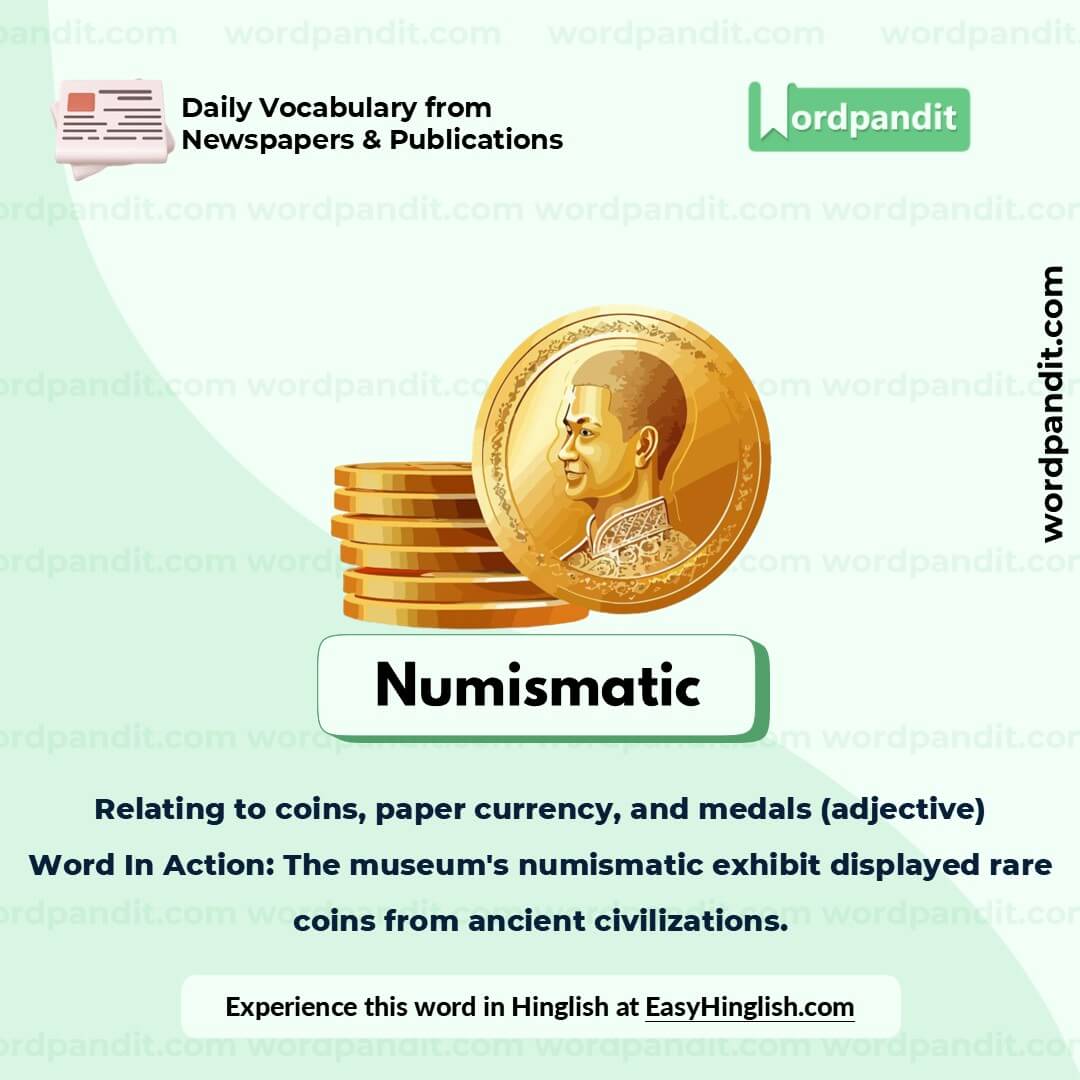Daily Vocabulary from Indian Newspapers and Publications
Welcome to Wordpandit’s Indian Vocabulary Hub
At Wordpandit, we understand the importance of staying rooted in the local context while expanding your language skills. This section focuses on enriching your vocabulary with words and phrases drawn from India’s leading newspapers and publications, ensuring you're learning vocabulary that is practical, relevant, and uniquely Indian.
Why Indian Sources Matter
We believe that the best way to master any language is by immersing yourself in local content. That’s why we carefully curate vocabulary from top Indian publications, including:
- The Hindu
- The Times of India
- The Economic Times
- Hindustan Times
- Live Mint
- The Indian Express
- And many others...
Stay Updated, Stay Relevant
With daily updates from Indian news sources, you’ll be consistently learning words that reflect the trends and shifts in Indian society and culture. Our focus is to provide vocabulary that enhances your understanding of the language in an Indian context.
How Wordpandit Supports Your Goals
Whether you’re preparing for exams, aiming to improve your professional communication, or simply want to stay connected with the latest Indian vocabulary, Wordpandit is here to guide you every step of the way.
Learn with a Practical Approach
Our interactive learning methodology includes real-world examples, engaging activities, and context-specific usage to ensure that every word becomes part of your active vocabulary.
Dive into Indian Vocabulary Today!
Why Choose Wordpandit?
Practical Learning: Focus on words you'll actually encounter in real-world reading, enhancing your comprehension and communication skills.
Diverse Content: From current affairs to scientific breakthroughs, our varied sources expose you to vocabulary across multiple domains.
Effortless Integration: Make Wordpandit a part of your daily routine. Just a few minutes each day can significantly boost your lexicon over time.
Your Path to Vocabulary Mastery
- Visit our Daily Vocabulary section regularly
- Explore new words and their usage in context
- Practice incorporating these words into your own writing and speech
- Track your progress as your vocabulary expands
Start Your Journey Today
Embark on your vocabulary enhancement journey with Wordpandit. By consistently engaging with our daily posts, you'll build a robust vocabulary that serves you well in academic, professional, and personal contexts.
Remember, a word a day keeps linguistic limitations at bay. Make Wordpandit your daily companion in the quest for vocabulary excellence!
WORD-1: Susceptible
Context:
"Older people... are more susceptible to sudden and severe weather fluctuations." - The Hindu
Explanatory Paragraph:
The word susceptible describes someone or something that is easily affected by certain conditions or influences. For example, older people may be more easily impacted by changes in weather due to their physical condition.
Meaning: Likely to be influenced or harmed by a particular thing (adjective)
Pronunciation: suh-SEP-tuh-buhl
Difficulty Level: ⭐⭐ (Beginner)
Etymology: From Latin susceptibilis, meaning "capable of taking or receiving"
Synonyms & Antonyms:
Synonyms: vulnerable, prone, exposed, sensitive
Antonyms: immune, resistant, invulnerable
Usage Examples:
- Children are often more susceptible to colds during the winter.
- The plant is susceptible to frost, so it needs to be protected during cold weather.
- Some people are more susceptible to peer pressure than others.
- Her immune system was weakened, making her more susceptible to infections.
Cultural Reference:
"In the midst of movement and chaos, keep stillness inside of you." - Deepak Chopra (on managing susceptibility to stress)
Think About It:
What are some personal habits or practices that make individuals less susceptible to negative influences?
Quick Activity:
Write down a list of factors that might make someone more susceptible to illnesses and how they could protect themselves.
Memory Tip:
Think of "susceptible" as "suspect-able," meaning something can easily be influenced or affected by something else.
Real-World Application:
Understanding susceptibility is important in healthcare, where doctors must assess patients' susceptibility to various conditions.
WORD-2: Impairments
Context:
"Many elderly people suffer from physical impairments." - The Hindu
Explanatory Paragraph:
An impairment is a reduction in strength or ability. It can refer to any physical or mental condition that limits a person's normal functions, such as mobility or cognitive functions.
Meaning: The state of being diminished, weakened, or damaged, especially physically or mentally (noun)
Pronunciation: im-PAIR-muhnt
Difficulty Level: ⭐⭐⭐ (Intermediate)
Etymology: From Latin impeiorare, meaning "to make worse"
Synonyms & Antonyms:
Synonyms: disability, limitation, defect, damage
Antonyms: strength, improvement, enhancement
Usage Examples:
- His hearing impairment made it difficult for him to follow the conversation.
- Visual impairments can make reading challenging for some people.
- The accident caused severe impairments in her ability to walk.
- The medication caused temporary cognitive impairments.
Cultural Reference:
Helen Keller, who overcame her impairments of blindness and deafness, became a symbol of hope and perseverance worldwide.
Think About It:
What kinds of accommodations can be made to help individuals with physical impairments lead independent lives?
Quick Activity:
Make a list of different types of impairments and suggest ways to support people who experience them.
Memory Tip:
Remember "impairment" by linking it to "impair," which means to make something worse or less effective.
Real-World Application:
Understanding impairments is crucial in developing inclusive practices in workplaces, schools, and public spaces.
WORD-3: Nudging
Context:
"The EC has been thinking of nudging political parties on the issue of internal democracy." - The Hindu
Explanatory Paragraph:
The word nudging refers to a gentle push or encouragement toward a certain action or decision. It’s often used in politics or behavioral economics when referring to influencing choices subtly without force.
Meaning: To prod or gently push someone towards an action (verb)
Pronunciation: nuhj-ing
Difficulty Level: ⭐⭐ (Beginner)
Etymology: From Middle English nudge, meaning "to push or poke lightly"
Synonyms & Antonyms:
Synonyms: prompt, encourage, push, prod, coax
Antonyms: ignore, discourage, deter
Usage Examples:
- The teacher nudged the students to submit their assignments on time.
- Governments often use public campaigns to nudge citizens toward eco-friendly behaviors.
- She nudged him to speak up during the meeting.
- The gentle nudge from his friend encouraged him to start his own business.
Cultural Reference:
Behavioral economists like Richard Thaler discuss the power of "nudging" in policy-making to guide people’s decisions without limiting their freedom of choice.
Think About It:
What are the ethical limits of nudging in politics and governance? When does a nudge become manipulative?
Quick Activity:
Think of a time you nudged someone or were nudged into making a decision. Was it effective, and how did you feel about it afterward?
Memory Tip:
Think of "nudging" as a gentle push to remember it means encouraging someone in a subtle way.
Real-World Application:
Governments, businesses, and educators often use nudging techniques to influence behavior, like encouraging healthy eating or prompt tax filings.
WORD-4: Numismatic
Context:
"Archaeological, historical and numismatic evidence are tangible things." - The Hindu
Explanatory Paragraph:
The word numismatic relates to the study or collection of coins, currency, and other forms of money. It often involves examining historical and cultural significance, which is why it appears alongside archaeological and historical contexts.
Meaning: Relating to coins, paper currency, and medals (adjective)
Pronunciation: noo-miz-MAT-ik
Difficulty Level: ⭐⭐⭐⭐ (Advanced)
Etymology: From French numismatique and Latin numismat-, meaning 'coin'
Synonyms & Antonyms:
Synonyms: coin-collecting, currency-related, monetary
Antonyms: non-financial, non-monetary
Usage Examples:
- He has a deep interest in numismatic collections, especially ancient Roman coins.
- The museum's numismatic exhibit showcased rare currencies from various empires.
- Numismatic experts can determine the value of old coins based on their rarity and condition.
- As a hobby, numismatic studies provide insight into the economic history of civilizations.
Cultural Reference:
"Numismatics, the collecting of coins, is often considered the hobby of kings, offering a glimpse into the wealth and trade of past civilizations." - National Geographic
Think About It:
What can coins and currency tell us about the culture and economy of ancient societies?
Quick Activity:
Research a coin from a past civilization and write a brief paragraph on what it reveals about the society that used it.
Memory Tip:
Remember the "numis" part of "numismatic" by thinking of "numbers" and coins, as both relate to money.
Real-World Application:
Numismatic knowledge is useful in museums, auctions, and historical research, where the value and authenticity of old currencies are important.
WORD-5: Vigorous
Context:
"The Opposition’s vigorous efforts keep issues in the spotlight." - The Hindu
Explanatory Paragraph:
The word vigorous describes something full of energy, strength, or enthusiasm. It is often used to refer to actions or efforts that are forceful, determined, and effective.
Meaning: Strong, active, and energetic (adjective)
Pronunciation: VIG-uh-ruhs
Difficulty Level: ⭐⭐⭐ (Intermediate)
Etymology: From Latin vigorosus, meaning "full of life or energy"
Synonyms & Antonyms:
Synonyms: energetic, forceful, dynamic, robust
Antonyms: weak, lethargic, sluggish, feeble
Usage Examples:
- The athlete trained with vigorous intensity in preparation for the competition.
- Vigorous debate erupted during the town hall meeting about the new policy.
- Her vigorous defense of her ideas impressed everyone in the room.
- The company's vigorous expansion strategy led to rapid growth.
Cultural Reference:
"A vigorous mind is strong and enduring; it quickly and easily becomes master of whatever it undertakes." - Marcus Tullius Cicero
Think About It:
Why do some issues require more vigorous efforts to stay in the public eye? What makes an effort vigorous?
Quick Activity:
Describe a situation in which you had to be vigorous to achieve a goal. What actions did you take?
Memory Tip:
Think of "vigorous" as related to "vigor," meaning full of energy and strength.
Real-World Application:
Using the word "vigorous" can help describe actions or efforts that are particularly energetic or effective, especially in work or sports contexts.
















